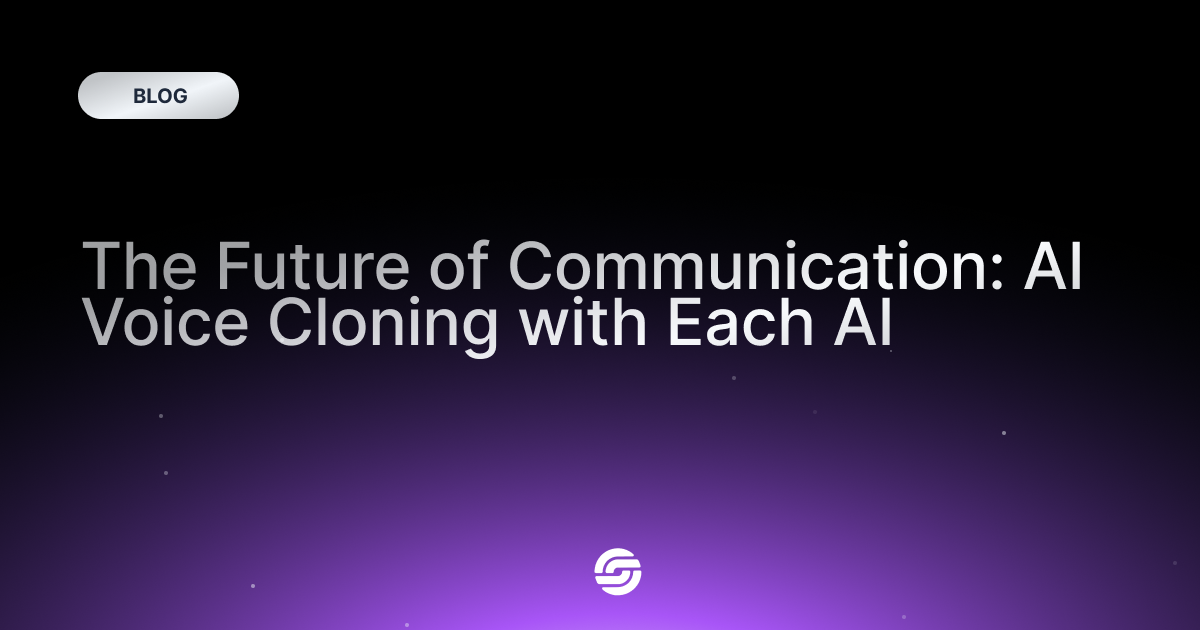The Future of Communication: AI Voice Cloning with Each AI

What is AI Voice Cloning?
AI voice cloning is a technology that allows us to create a digital replica of someone’s voice. By analyzing the way a person speaks—such as their tone, rhythm, and pitch—AI can generate speech that sounds just like the original voice. This technology is becoming more common, finding uses in industries like entertainment, education, and customer service.
How Does AI Voice Cloning Work?
At its core, AI voice cloning involves capturing a person’s voice and teaching a machine how to mimic it. Here’s a simple breakdown of how it works:
Steps in the Voice Cloning Process:
- Collect Voice Samples: The first step is to record the voice you want to clone. These recordings should capture a range of speech, from different pitches to tones, so the AI has enough data to work with.
- Training the AI: The AI listens to these recordings and begins to understand the voice’s unique patterns. It learns to replicate everything from how the person pronounces certain words to their natural pauses and inflections.
- Synthesizing New Speech: Once the AI has “learned” the voice, you can type in new text, and the AI will generate audio that sounds like it’s spoken by the person in the recordings. The result is a convincing, natural-sounding voice clone.
Use Cases for AI Voice Cloning
AI voice cloning isn’t just a cool technology; it’s already being used in many different ways. Here are some key areas where it’s making a difference:
1) Media and Entertainment
In the media world, voice cloning offers a way for content creators to streamline their work. For instance, actors can have their voices cloned to dub lines in different languages or to continue a project when they aren’t available for recording. Similarly, podcasters and audiobook creators can produce content more efficiently.
2) Education
In education, voice cloning helps create personalized learning experiences. Teachers’ voices can be cloned to create engaging content, even when they aren’t available to record it themselves. This is especially useful for online courses, where the student can still feel connected to the instructor through their voice.
3) Virtual Assistants
Voice cloning is also improving the experience of using virtual assistants. Instead of interacting with generic, robotic voices, AI allows companies to create custom voices that better represent their brand or make digital assistants more relatable for users.
How Does Each AI Voice Cloning is work?
Each AI is making AI voice cloning accessible for a wide audience, whether you’re an app publisher or an indie hacker. Our platform is designed to be easy to use, even if you’re not a tech expert. Here’s how they stand out:
- Simple Setup: With Each AI Voice Cloning API, the process of creating a voice clone is straightforward. You upload the voice samples, and the AI does the hard work of analyzing and replicating the voice.
- Customization Options: Each AI allows users to fine-tune their cloned voice, making sure it captures the right nuances and sounds as natural as possible.
- Focus on Ethics: One of the biggest concerns with AI voice cloning is misuse, but Each AI prioritizes ethical use. They ensure that voice cloning is only done with proper consent, protecting individuals and preventing potential abuse.
Explore our other ready to use AI workflows here. We provide over 30 ready-to-use AI workflows designed to help connect and run AI models faster and more easily.
Conclusion
AI voice cloning is transforming how we communicate, making it easier to replicate voices for a variety of uses. With platforms like Each AI, this technology is becoming more accessible, offering businesses and individuals the chance to create high-quality, realistic voice clones. As AI continues to improve, we can expect even more exciting applications, allowing us to interact with technology in increasingly personalized and meaningful ways. You can start building here.
